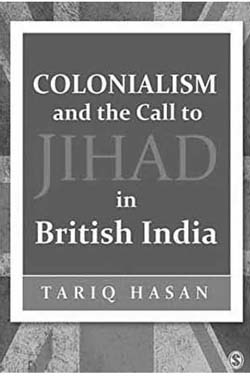Jihad is a much used and abused term in the contemporary twenty-first century. Today’s world has seen the proliferation of self-proclaimed jihadi groups claiming responsibility for terror strikes like the 9/11 attacks in the USA and the recent Paris strikes. The backdrop of these terrorist activities is the geopolitics of wars and oil refineries and the quest by western powers to spread democracy to the so called non-democratic Islamic world. While the hypocrisy of the western powers is evident post the wars on Iraq, Afghanistan and now Syria, the easily assumed antagonism between Islam and democracy is also being questioned now.
Tariq Hasan’s effort in Colonialism and the Call to Jihad has been to undo the misconceptions that have risen with regard to the conception of Jihad within the Islamic discourse. To undergo such an exercise Hasan chooses the stories of the ulemas or Muslim clergy of British India who often under the banner of Jihad fought against the colonial regime. For Hasan the retelling of these narratives is necessary. He suggests that these crucial stories have been forgotten from the pages of our history text-books. British colonial historians are to blame for undermining the role of the ulemas in India’s freedom struggle and it is the fusion between the ideas and struggles of the Muslim clerics and Indian nationalists of the nineteenth and early twentieth century that Hasan’s work seeks to unravel.
Further in the late twentieth century, post the 1980s, Hasan claims that America began funding madrasa across Pakistan to wage jihad against the pro-Soviet regime in Afghanistan, which drew closely from the ideologies of the Wahabi school of thought rooted in Saudi Arabia. He says that it is due to these factors that western analysts have erroneously linked contemporary madrasas with the original Deoband seminary from nineteenth century South Asia. This confusion prevailing in the West regarding notions of Jihad and different sects and groups in Islam which upheld them in different points of time in history is what Hasan aims to dispel.
The sweep of Hasan’s historical narrative is grand. He begins with stories of Muslim religious leaders from the nineteenth and twentieth century South Asia and through these narratives attempts to engage with events from the contemporary twenty-first century.
The first Muslim leader that Hasan begins his book with is Sayyid Ahmed Barelvi who gave a call for Jihad in the North Western Frontier Punjab against the mighty Raja Ranjit Singh. Subsequently Barelvi gave a call against the British and died fighting in the battlefield. Hasan attempts to demystify the character of Sayyid Ahmed and places it in its early nineteenth century context of British India. However, he does not add much to what we already know from previous more nuanced works on the subject.
Continue reading this review

